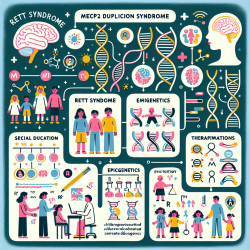As practitioners dedicated to improving outcomes for children with Autism Spectrum Disorder (ASD), staying informed about the latest research and treatment advancements is crucial. The recent review article, New Advances in the Diagnosis and Treatment of Autism Spectrum Disorders, provides a comprehensive overview of cutting-edge developments in the field. This blog aims to translate these research findings into actionable strategies that can enhance your practice and encourage further research.
Key Findings from the Research
Advances in Diagnostic Methods
Traditional diagnostic methods for ASD have relied heavily on behavioral assessments. However, recent advancements have introduced more precise and objective tools:
- Genetic Testing: Identifying specific genetic variants linked to ASD can provide more accurate diagnoses and personalized treatment plans.
- Neuroimaging: Techniques like fMRI and DTI offer insights into the structural and functional differences in the brains of individuals with ASD.
- Early Screening Methods: AI and eye-tracking technologies are improving the accuracy and convenience of early ASD detection.
Innovative Treatment Approaches
In addition to traditional behavioral interventions, several new treatment modalities are showing promise:
- Biofeedback and Neuromodulation: Techniques such as transcranial magnetic stimulation (TMS) are being explored to improve brain function in individuals with ASD.
- Technology-Assisted Interventions: Tools like virtual reality and interactive apps are providing new ways for children with ASD to learn and communicate.
- Diet and Nutrition Interventions: Optimizing diet and nutrition can support brain development and improve behavioral symptoms.
Implications for Practice
Implementing these research findings can significantly enhance the quality of care you provide:
- Adopt New Diagnostic Tools: Incorporate genetic testing and neuroimaging into your diagnostic process to achieve more accurate and individualized assessments.
- Explore Innovative Treatments: Consider integrating biofeedback, neuromodulation, and technology-assisted interventions into your treatment plans.
- Personalize Nutrition Plans: Work with nutritionists to develop dietary interventions tailored to the specific needs of children with ASD.
Encouraging Further Research
While these advancements are promising, there is still much to learn. Engaging in and supporting further research is essential to continue improving outcomes for children with ASD. Collaborate with researchers, participate in clinical trials, and stay updated on the latest findings to ensure that your practice remains at the forefront of ASD treatment.
To read the original research paper, please follow this link: New advances in the diagnosis and treatment of autism spectrum disorders.










